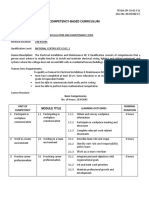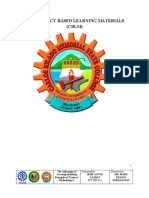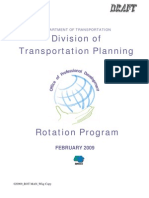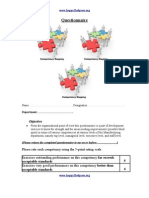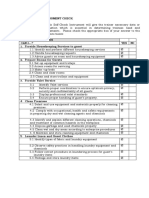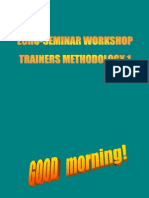Assessor Moderator, Mentor Coach
Assessor Moderator, Mentor Coach
Uploaded by
geraldine franzsenCopyright:
Available Formats
Assessor Moderator, Mentor Coach
Assessor Moderator, Mentor Coach
Uploaded by
geraldine franzsenOriginal Title
Copyright
Available Formats
Share this document
Did you find this document useful?
Is this content inappropriate?
Copyright:
Available Formats
Assessor Moderator, Mentor Coach
Assessor Moderator, Mentor Coach
Uploaded by
geraldine franzsenCopyright:
Available Formats
Module
3
Assessor, moderator,
coach and mentor
Page
Specific outcomes....................................................................... 64
Learning outcomes ..................................................................... 64
1. What is assessment? ....................................................... 65
2. What is moderation? ........................................................ 69
3. The role of the assessor................................................... 69
4. The role of the moderator................................................. 76
5. Coaching .......................................................................... 78
6. Mentoring.......................................................................... 82
7. Summary .......................................................................... 85
SKIL
E D U T E L
LS DEVELOPMENT
© Copyright reserved
Assessor, moderator, coach and mentor NQF 5
63
Module 3
Specific outcomes
1. Plan and prepare for assessment.
2. Prepare candidate for assessment.
3. Conduct assessment and document evidence.
4. Evaluate evidence and make assessment judgement.
5. Provide feedback to relevant parties.
6. Review assessment.
Learning outcomes
Upon completion of this module, the candidate assessor
(moderator) should be able to:
• Communicate the concept of assessment to learners,
managers, coaches and mentors
• Establish a relationship with moderators and finalise a
common approach to the assessment process with them
• Develop relationships with coaches and mentors in order to
ensure co-operation and integrated assessment
• Contribute to the effective implementation of skills
E D U T E L
DEVELOPMENT
development by being able to identify the responsibilities and
functions of major role players
© Copyright reserved
• Give appropriate feedback to coaches and mentors in terms
of their contributions to the development of the learners
LS
SKIL
• Use the feedback received from moderators to improve and
develop the assessment process in the workplace
64 Assessor, moderator, coach and mentor
Module 3
1. What is assessment?
Assessment can be defined in a number of ways, one of which
captures the general approach to assessment as follows:
"The process of measuring applied competence by collecting and Definition
interpreting evidence of such competence."
To capture the essence of the elements of the process in more
direct terms, assessment can be defined as:
"A process that measures whether or not a learner has achieved
the intended outcome(s) when comparing their capabilities to the
assessment criteria set out in the relevant unit standard(s) or
qualifications."
The second definition of assessment given above highlights a
number of key elements of the assessment process.
• Firstly, the assessment is a process. This means that it has a
definite starting point, a definite ending point and a logical,
sequential number of phases between these two limits. The
success of assessment lies in the manner in which the
assessor executes and controls the assessment process.
• Secondly, the definition refers to a set of measurements.
Assessors need to determine the extent to which the learning
process has resulted in a change in the behaviour of a learner
and the level to which such changes are being sustained. To
be able to measure change, the assessors must have a set of
SKIL
E D U T E L
measurement tools to measure with.
LS
© Copyright reserved
DEVELOPMENT
• Thirdly, the definition talks about achievement by the learner.
The assessor must clearly understand what the intended
result of a learning intervention must be and then establish
through the application of measurement whether the result
has been achieved. Achievement is described by the
outcomes specified in a unit standard.
Assessor, moderator, coach and mentor
65
Module 3
Notes • Fourthly, the assessment process is a comparison event. The
assessor measures achievement by comparing actual results
achieved with results required. The extent to which the actual
results compare with the desired results will determine
whether a learner has achieved the desired competence or
not.
• In the fifth instance the definition refers to performance criteria
to be applied. Performance criteria are the benchmarks
against which outcomes are compared, and generally reflect
the desired level of competence required. It furthermore
describes "best practice" levels to ensure excellent outcome
achievement. The difficulty that assessors sometimes face is
to decide how close the actual results achieved match the
desired outcomes.
• Lastly, the definition refers to unit standards, as mentioned in
previous modules; unit standards are the cornerstones upon
which determination of competence is based. Not having
appropriate unit standards will make it quite difficult, if not
impossible, for assessors to be able to measure competence.
" The objectives of assessment
• Diagnose the performance of an employee based on agreed
standards.
• Classify an employee in terms of a skills-based award.
• Confirm employee’s competency in applying knowledge, skills
E D U T E L
DEVELOPMENT
and attitudes.
© Copyright reserved
• State that a certain level has been attained.
• Confirm progress in learning.
LS
SKIL
• Recognise prior learning (RPL).
• Identify development.
66 Assessor, moderator, coach and mentor
Module 3
" Standard-based assessment Notes
Standard-based assessment is the process that assesses the
competences and work performance of an individual against specific
standards. These standards are usually national standards and are
used as the benchmark for a nationally agreed performance level.
The standards make the process objective and unbiased.The
standards to be performed to are agreed at the assessment planning
meeting between the candidate and the assessor.
Evidence is collected and competence is judged against it.
Assessment can further be subcategorised into three distinct
categories namely:
• Formative assessment
• Integrated assessment
This form of assessment is a process of assessing a
qualification as a whole, not merely as the sum of its parts.
• Summative assessment
The South African Qualifications Authority guidelines for the
assessment of NQF registered unit standards and qualifications
refers:
SKIL
E D U T E L
" Formative and summative assessment
LS
© Copyright reserved
DEVELOPMENT
OBET makes use of formative and summative assessments.
Formative assessment refers to assessment that takes
place during the process of learning and teaching.
Assessor, moderator, coach and mentor
67
Module 3
$
Notes
Summative assessment is assessment for making a judgement
about achievement. This is carried out when a learner is ready to
be assessed at the end of a programme of learning. Summative
assessment includes workplace and instructional learning
assessment.
Compare the two forms of assessment:
Formative assessment Summative assessment
• Designed to support the teaching • At the end of a learning
and learning process programme (qualification, unit
standard, or part qualification)
• Assists in planning future
learning • To determine whether the learner
is competent or not yet
• Diagnoses the learner’s
competent
strengths and weaknesses
• In knowledge and inputs-based
• Provides feedback to the learner
systems, this usually occurs after
on his/her progress
a specified period of study, e.g.
• Helps to make decisions on the one year
readiness of learners to do a
• In OBET, a learner’s readiness
summative assessment
determines when assessments
• Is developmental in nature will take place
• Credits/certificates are not • Is carried out when the assessor
awarded and the learner agree that the
learner is ready for assessment
Results initially collected as results for formative assessment can
NB be used for summative assessment with the agreement of the
learner. This will prevent having to assess outcomes twice.
The organisation of the learning programme will facilitate
informed decisions on when summative assessments can
E D U T E L
DEVELOPMENT
take place, e.g. a learning programme can be organised around
one outcome or a set of outcomes, depending on what is
© Copyright reserved
appropriate in terms of ensuring the learner’s success.
Summative assessments are administered when a learner has
gone through such a programme and is ready to be assessed.
LS
SKIL
On declaration of competence, credit is then given, recorded and
reported.
68 Assessor, moderator, coach and mentor
Module 3
2. What is moderation?
Definition
Moderation is the process of checking assessments to ensure
that they have been fair, valid and reliable. The process ensures
that assessors are all interpreting standards in the same way, and
that there is consistency across time and context.
3. The role of the assessor
In general terms the assessor is responsible for judging the
competence of a learner in meeting the required standards.
Within the South African context, the role of an assessor is defined as:
Definition
"A person who is registered by the relevant ETQA in accordance
with criteria established for this purpose to measure the
achievement of specified NQF standards and qualifications."
" Activities of assessors:
• Plan and prepare for assessment
- Explaining the unit standards and assessment process
to candidates (preparing candidates for assessment)
SKIL
E D U T E L
- Helping candidates to identify their present competence
LS
© Copyright reserved
in relation to the unit standards
DEVELOPMENT
- Encouraging candidates to identify and gather evidence
of their competence
- Planning development and reviews with candidates
Assessor, moderator, coach and mentor
69
Module 3
Notes • Assessing candidates
• Evaluating evidence
• Carrying out reviews with candidates and questioning them
about assessments
• Making assessment decisions, giving positive and constructive
feedback and completing any documentation (review
assessment)
" An assessor’s competences are divided into three areas,
namely:
• Technical competence
A subject matter expert in the contents and standards of the
capabilities being assessed.
• Assessment competence
An expert regarding the use of standards and the assessment
process. An assessor must be able to give effect to the total
assessment process from the first to the last phase.
E D U T E L
DEVELOPMENT
• Communication competence
© Copyright reserved
An assessor must be able to communicate well, verbally and in
writing. He/she must be able to communicate at different levels
during the assessment process. The assessor must also have
LS
SKIL
excellent listening and observation skills.
70 Assessor, moderator, coach and mentor
Module 3
" Competences to be achieved by an assessor Notes
• Assess candidate’s performance
- Prepare, agree and review assessment plans
- Collect and judge performance evidence against
criteria
- Collect and judge knowledge evidence
- Make assessment decision and provide feedback
- Complete assessment records
• Assess candidate using differing sources of evidence
- Judge evidence and give feedback.
- Make decision using differing sources of evidence and
give feedback.
" The assessor’s role involves the following competences:
• Judging the candidate’s ability to:
- Apply acquired skills, knowledge and abilities of a
variety of work activities
- Organise priorities, manage time, keeping to deadlines,
SKIL
E D U T E L
and meeting customers’ expectations
LS
© Copyright reserved
DEVELOPMENT
- Deal with contingencies without disrupting regular work
schedules
- Adapt to different work environments, both physical and
in respect to people
Assessor, moderator, coach and mentor
71
Module 3
Notes • Plan and prepare the candidate for assessment
The collection of information and decisions about the following
issues must be completed:
- Discuss the process with the candidate before the
actual assessment.
- Decide upon suitable methods of assessment to use.
- Decide which standards/competences to focus on.
- Decide upon the required evidence that the candidate
must provide in order to meet the standards.
- Be familiar with relevant standards.
- Prepare the venue and required equipment to be used
during the assessment process.
• Develop and/or adapt assessment tools
- Review the assessment tools, ensuring relevance.
- Familiarise yourself with the tools.
• Read through the assessment standards
- Review the standards to ensure relevance and
currency.
- Review criteria.
E D U T E L
DEVELOPMENT
© Copyright reserved
• Conduct the assessment
- Gather the evidence.
LS
SKIL
- Compare the evidence to the criteria.
- Make a judgement decision regarding competence.
72 Assessor, moderator, coach and mentor
Module 3
• Feedback to stakeholders Notes
- Communicate with the candidate during the assessment
process.
- Communicate with the candidate at the end of the
assessment process.
- Communicate with the line manager after the
assessment.
• Record assessment data
Document assessment-related data on the following aspects:
- The candidate, evidence, assessment process,
assessment decision.
• Review the assessment
SKIL
E D U T E L
LS
© Copyright reserved
DEVELOPMENT
Assessor, moderator, coach and mentor
73
Module 3
Notes
The South African Qualifications Authority guidelines for the
assessment of NQF registered unit standards and qualifications
refers:
Reassessment and appeals
The assessment process has to have a built-in process for
reassessment. When learners have to undergo reassessment,
they have to be given feedback so that they can concentrate on
areas of weaknesses. Ideally, continuous formative assessments
should minimise the need for reassessment, since the assessor
and the learner agree on a summative assessment only when
they both feel that the learner is ready for it.
Reassessment should comply with the following conditions:
• Reassessment should take place in the same situation or
context and under the same conditions.
• The same method and assessment instrument may be
used, but the task and materials should be changed.
However, they should be of the same complexity and level
as for the previous assessment. Where the methods and
instruments are changed, they must be appropriate for the
outcomes specified.
NOTE
Where several outcomes have been assessed and some, but not
NB all, were achieved successfully, a decision has to be made about
the credits for the successful outcomes, i.e. will the learner be able
to retain these credits without having to be reassessed? If so,
what would the assessment consist of then? Care should be taken
regarding how often reassessment can be taken, and the length
of time between the original assessment and the reassessment. A
learner who is repeatedly unsuccessful should be given guidance
on other possible and more suitable learning avenues.
74 Assessor, moderator, coach and mentor
Module 3
Notes
The ETQA should ensure that there is an appeals procedure in
place, i.e. appeals against an assessment decision. Learners
should be secure in the knowledge that they can appeal against
an unfair assessment.
The provider has to develop an appeals procedure in line with the
requirements of the ETQA, for example:
Learner’s appeal Example
(1)
YES Assessor(s) NO
%
(2)
YES Provider moderation committee NO
(internal)
(3)
YES External moderation committee NO
(ETQA)
(PLEASE NOTE: The above is an example only)
Appeals can be brought against:
• Unfair assessments
• Invalid assessments
SKIL
E D U T E L
• Unreliable assessments
LS
© Copyright reserved
DEVELOPMENT
• The assessor’s judgement, if considered biased
• Inadequate expertise and experience of the assessor if it
influenced the assessment
• Unethical practices
Assessor, moderator, coach and mentor
75
Module 3
Notes 4. The role of the moderator
The moderator is responsible for ensuring that the principles of
quality assurance are applied and maintained during the assessment
of a learner’s performance by assessors.
Moderators must therefore be well versed in the assessment
process, thoroughly understand the principles and procedures of
assessment, and be knowledgeable about the objectives of a
learning intervention and the outcomes to be achieved.
An assessor must be a functional specialist in order to be able to
assess competence. A moderator, on the other hand, need not be a
functional specialist but must be very skilled in the application of
process and quality assurance.
Competences to be achieved by a moderator
• Moderate the assessment process:
- Advise and support learners
- Maintain and monitor arrangements or processing
assessment information
- Moderate assessment practice
E D U T E L
DEVELOPMENT
© Copyright reserved
LS
SKIL
76 Assessor, moderator, coach and mentor
Module 3
Notes
The South African Qualifications Authority guidelines for the
assessment of NQF registered unit standards and qualifications
refers:
" Introduction
Moderation ensures that people who are being assessed are
assessed in a consistent, accurate and well-designed
manner. It ensures that all assessors who assess a particular
unit standard or qualification are using comparable assessment
methods and are making similar and consistent judgements about
learners’ performances.
Moderation of assessment occurs at both the level of the provider
(internal moderation) and the level of the ETQA (external
moderation).
The SAQA moderation system follows a layered approach, for
example
NSBs submit qualifications with moderation options
1 NSBs
ETQAs establish moderation systems for
2 ETQAs accredited providers
Providers establish internal moderation
3 Providers systems in line with the ETQAs
Moderating SAQA appoints moderating bodies to
4 bodies assure consistency in unit standards and
qualifications across one or more ETQAs
SKIL
E D U T E L
NOTE
LS
© Copyright reserved
DEVELOPMENT
The NQF system is one in which centralised, mainly public
examinations at existing levels (final examinations, as we know
them) are a small part of the assessment system. A substantial
amount of assessment is developed by the provider and
individual assessors. The importance of moderating systems can
Assessor, moderator, coach and mentor
77
Module 3
$
Notes
therefore not be overemphasised. This will ensure that the system
is credible and that assessors and learners behave in ethical
ways.
Furthermore, moderation in the NQF is a means for professional
interaction and upgrading the skills of practitioners so as to
continuously improve the quality of assessment.
Therefore, the main functions of moderation systems are:
• To verify that assessments are fair, valid, reliable and
practicable
• To identify the need to redesign assessments if required
• To provide an appeals procedure for dissatisfied learners
• To evaluate the performance of assessors
• To provide procedures for the deregistration of
unsatisfactory assessors
• To provide feedback to the NSBs on unit standards and
qualifications
7. Coaching
In a programme designed to develop the competence of a person as
E D U T E L
DEVELOPMENT
an assessor or moderator, one could quite rightly ask why such a
© Copyright reserved
programme should include knowledge about the role and functions
of a coach and the coaching process.
It has been the experience of the author that the ability of a
LS
SKIL
candidate to integrate knowledge with skill during the learning
process, and integrate knowledge in a holistic manner in the
78 Assessor, moderator, coach and mentor
Module 3
workplace is to a significant extent determined by the coach involved Notes
with the candidate, as well as the effectiveness of the coaching
process.
In many instances during the assessment and feedback phases an
assessor will find that liaising with the coach of a candidate can
ensure that the candidate develops the required competence more
effectively.
In many instances the inability of a candidate to integrate knowledge
in the workplace can be traced back to poor relationships or
communication problems between the learner and the coach.
The assessor inevitably then has to provide guidance and
counseling, both to the learner and the coach, to ensure that the
objectives of the assessment are achieved.
The purpose of this programme is not to qualify an assessor as a
coach, but to provide an overview of the role and functions of a
coach and sensitise the assessor to this critical role in the skills
development process.
" Who is responsible for coaching?
Coaching is the responsibility of a line manager who has immediate
and day-to-day accountability for a learner’s performance. There is
therefore a clear relationship involving status and authority, which,
even if sensitively handled, is an underlying reality.
SKIL
E D U T E L
LS
© Copyright reserved
DEVELOPMENT
" What is the role of a coach?
The role of a coach is a broad one, combining sponsor with advisor,
counselor, coach, motivator and supporter. The precise combination
of these roles, and how they are used in a particular relationship, or
Assessor, moderator, coach and mentor
79
Module 3
Notes in a particular programme, depends on the needs of the individual
and on the organisation’s requirements.
Some learners may need a counselor while others may need a role
model. What is certain, is that a coach is someone who can offer
support, encouragement and practical advice to the learner.
The involvement of a coach with a learner can take many forms,
such as:
• Agreeing development targets
• Obtaining resources and information
• Advising on practical ways forward
• Describing an approach to problem solving
• Providing guidance and reassurance where necessary
• Unblocking thought processes
• Defining work-based projects
" What are the attributes of a coach?
The following are important, but does not necessarily constitute an
exhaustive list:
E D U T E L
DEVELOPMENT
• Patience
© Copyright reserved
• Sense of humour
• Assertive, but not aggressive or patronising
LS
SKIL
• Firm, but not domineering
80 Assessor, moderator, coach and mentor
Module 3
• Knowledgeable and skilful Notes
• Reflective and analytical
• Demonstrating confidence and self-belief
• Able to manage emotions in yourself and others
• Be a motivator and achiever
• Be a good role model
" How should a coach execute this responsibility?
• By being involved in what the learner is doing. A coach must
not be remote and must not sit on the fence.
• A coach must encourage self-analysis and critical examination
of the learner’s work. The learner must be challenged with
opposite views and real-life experiences.
• A coach must actively seek and discuss the learner’s views
and opinions and temper them with his/her own views.
• Consider openly and honestly any inhibitors to success.
Create opportunities to explore some of the learner’s own
judgements and decisions.
• Be prepared to describe your own work techniques, problems
SKIL
E D U T E L
and solutions. Provide the learner with a balanced spread of
LS
© Copyright reserved
learning opportunities.
DEVELOPMENT
• Put the learner in touch with other people with relevant
experience and others who are also learning.
Assessor, moderator, coach and mentor
81
Module 3
Notes • Talk to other coaches and find out how they are helping their
learners to achieve their goals.
" The relationship between assessor and coach
Understanding the role and responsibilities of the coach in the
learning process will enable the assessor to assess the learner in a
manner which will further enhance the work done by the coach.
The assessor will also find it easier to communicate with the coach
and even discuss views and approaches to improve a learner’s
competence.
The assessor, learner and coach are three very important members
of the skills development team. They therefore need to understand
each other’s roles and responsibilities and be supportive of one
another at all times.
6. Mentoring
Despite a lot of material being available on the distinct differences
between the role of coach and mentor in a learner relationship, there
is still a lot of confusion amongst people as to the differences.
In many situations the role of coach and mentor are still deemed to
be one and the same.
DEVELOPMENT
E D
"
© Copyright reserved
Defining mentoring
Definition
Mentoring can be defined as a deliberate, or spontaneous, pairing
of a more skilled and experienced person with a lesser skilled or
LS
SKIL
experienced one, with the agreed-upon goal of having the lesser
skilled person grow and develop specific competences.
82 Assessor, moderator, coach and mentor
Module 3
" What does a mentor do? Notes
A mentor may agree to perform one or more of the following
functions:
• Act as a source of information on the mission and goals of the
organisation
• Provide insight into the organisation’s philosophy of human
resource development
• Tutor specific effective behaviour and how it functions in the
organisation
• Give feedback on observed performances
• Serve as a confidant in times of personal crises and problems
• Assist the learner in plotting a career path
• Meet with the learner at agreed times to give feedback
• Agree to a no-fault conclusion of the mentorship relationship
when the time is right
• Maintain the integrity of the relationship between the learner
and the learner’s direct manager
" What are the main competences of a mentor?
In the mentoring relationship it has been found that mentors need to
be competent in the following areas:
SKIL
E D U T E L
• Strong interpersonal skills
LS
© Copyright reserved
• Organisational knowledge
DEVELOPMENT
• Exemplary supervisory skills
• Technical competence
Assessor, moderator, coach and mentor
83
Module 3
Notes • Personal power and charisma
• Status and prestige
• Willingness to be responsible for someone else’s growth
• Ability to share credit
• Patience and risk taking
" Differences between the roles of mentor and coach
Careful analysis of the roles and responsibilities between coach and
mentor in a learner relationship should highlight the facts that:
• Coaching is inherently a line manager’s responsibility, while
mentoring could be a deliberate or spontaneous relationship
where no line authority is present whatsoever.
• Secondly, the coach has the responsibility for developing the
knowledge and skill of a learner in the direct task-related
areas of the workplace, while the mentor develops the skill
and knowledge of the learner in respect to the broader
organisational environment.
• Thirdly, the coach accepts responsibility for the direct work-
related performance of the learner. The mentor accepts
responsibility for the integration of the learner into the culture
and value systems of the organisation.
E D U T E L
DEVELOPMENT
• The learner and coach may function in a strictly superior-
© Copyright reserved
subordinate relationship, while the relationship between
mentor and learner is informal and not strictly bound by
organisational hierarchy and protocol.
LS
SKIL
84 Assessor, moderator, coach and mentor
Module 3
" Assessor and mentor Notes
Similar to the situation with a coach, assessors must have a good
understanding of and appreciation for the role that mentors can play
in a learner’s development.
The mentor can have just as much influence on the skills
development of a learner as the coach, albeit on another level. For
the assessor it is important to recognise that the mentor is a key
player in the integration of the learner’s skills and knowledge in the
broader organisational context.
It was previously stressed that assessment should have a holistic
approach to a learner’s competence assessment. Assessors may
find it useful to exchange ideas and views with mentors during the
assessment process, particularly if learners are not achieving holistic
competence.
7. Summary
This module has concentrated on the different participants involved
in the education, training or development of a learner. It should be
quite clear to a candidate assessor that appreciation of the roles and
responsibilities of the moderator, coach, mentor and the assessor is
essential for successful skills development in the workplace.
The assessor should also recognise that close working relationships,
regular interaction and uniformity in approach to the learning
approach are vital for all the role players discussed in this module.
SKIL
E D U T E L
Lastly, assessors should realise that they will be assessing the
LS
© Copyright reserved
competence development of the learner, but by doing so they are
DEVELOPMENT
indirectly assessing the inputs and efforts of the coach and mentor.
Similarly, moderators should realise that they will be evaluating the
quality brought into the learning process by assessor, coach and
mentor. None of the role-players identified can therefore stand apart
from the process and isolate their function from the rest of the players.
Assessor, moderator, coach and mentor
85
Module 3
Notes Notes
E D U T E L
DEVELOPMENT
© Copyright reserved
LS
SKIL
86 Assessor, moderator, coach and mentor
You might also like
- (21042019 1348) Level 4 International Award in Food Safety Qualification SpecificationDocument15 pages(21042019 1348) Level 4 International Award in Food Safety Qualification SpecificationZubair AhmedNo ratings yet
- Learner PoE GuideDocument58 pagesLearner PoE GuideUmvakela ConstructionNo ratings yet
- Assessors GuideDocument25 pagesAssessors Guidejoeven64100% (1)
- CPD ChecklistDocument2 pagesCPD ChecklistRJ GabuyaNo ratings yet
- Opito Approved Standard Competence Assessor Training StandardDocument25 pagesOpito Approved Standard Competence Assessor Training StandardAfandi Mohamad Zaini100% (1)
- Copy Paste AFS Training and Assessment Strategy (Updated)Document12 pagesCopy Paste AFS Training and Assessment Strategy (Updated)Steve TowsonNo ratings yet
- QMS11403-1 20160705 Joining-Instruction BOSIET EDocument5 pagesQMS11403-1 20160705 Joining-Instruction BOSIET EmashanghNo ratings yet
- f11 Competency Based CurriculumDocument41 pagesf11 Competency Based CurriculumVictor Rosales100% (4)
- CBLM Occupational Health SafetyDocument98 pagesCBLM Occupational Health Safetyruderic de juanNo ratings yet
- Procedures Manual On UtprasDocument42 pagesProcedures Manual On UtprasAttorney Ma. Leny Ignalaga100% (1)
- Conduct Competency Asessment1Document34 pagesConduct Competency Asessment1Nette de Guzman100% (1)
- Perform Pre and Post Operation ProcedureDocument61 pagesPerform Pre and Post Operation Procedureangelica lloveras100% (1)
- Guide To Opito Approval For Training ProvidersDocument31 pagesGuide To Opito Approval For Training ProvidersmashanghNo ratings yet
- Kinang J Bhezma S. - TM Plus Facilitate CBTDocument30 pagesKinang J Bhezma S. - TM Plus Facilitate CBTSakilan, Al-finneeNo ratings yet
- Conduct Competency AssessmentDocument12 pagesConduct Competency AssessmentCrash ZerocoolNo ratings yet
- Guideline On The Accreditation and Approval Process For VTS TrainingDocument34 pagesGuideline On The Accreditation and Approval Process For VTS TrainingAndrei ZahaNo ratings yet
- Competency Based Learning Materials (CBLM)Document56 pagesCompetency Based Learning Materials (CBLM)Kimochi SenpaiiNo ratings yet
- OpitoDocument34 pagesOpitohidayatu solihinNo ratings yet
- FLS DemoDocument12 pagesFLS DemoAyen MalabarbasNo ratings yet
- TESDADocument20 pagesTESDAKissy BesarioNo ratings yet
- Trainers Record Book TRBDocument9 pagesTrainers Record Book TRBQueen Realyn AlmirezNo ratings yet
- Hse PpeDocument5 pagesHse Ppeapi-26802090No ratings yet
- ScriptDocument5 pagesScriptRodolfo B. CanariaNo ratings yet
- Form O - CPD Record - WF - V3.0 EnglishDocument5 pagesForm O - CPD Record - WF - V3.0 EnglishsasaNo ratings yet
- F11 - CBC Auto NC-1Document46 pagesF11 - CBC Auto NC-1Ait BiñanNo ratings yet
- CBLM - Apply OSH Practice in A CBT&A Environment - Version - 2Document46 pagesCBLM - Apply OSH Practice in A CBT&A Environment - Version - 2সত্য চন্দ্র প্রামাণিক100% (2)
- Training EvaluationDocument2 pagesTraining EvaluationJeffrey SalinasNo ratings yet
- Presentation Manual Handling NEBOSH CertificateDocument12 pagesPresentation Manual Handling NEBOSH CertificateKai FaheemNo ratings yet
- Pre Assessment InstrumentDocument1 pagePre Assessment InstrumentRenel CuaresmaNo ratings yet
- Safety Training Program DevelopmentDocument4 pagesSafety Training Program DevelopmentmicahNo ratings yet
- Manual Handling PDFDocument2 pagesManual Handling PDFVITALNo ratings yet
- Job Rotation Plan Sample6Document27 pagesJob Rotation Plan Sample6Abu HmaidNo ratings yet
- OPITO Competence Assessor CourseDocument2 pagesOPITO Competence Assessor CourseZulfadli Ahmad100% (1)
- 6) Perform Underchassis Preventive MaintenanceDocument52 pages6) Perform Underchassis Preventive MaintenanceROSAN YUMANGNo ratings yet
- Complete Templates PlanDocument28 pagesComplete Templates PlanSelanreb YdnarNo ratings yet
- Competency Mapping QuestionnaireDocument14 pagesCompetency Mapping QuestionnaireAkanksha AroraNo ratings yet
- QPT01 - Training and Personnel Competency - 15092022Document26 pagesQPT01 - Training and Personnel Competency - 15092022saidmohamadkamil100% (1)
- PTW Training 22Document39 pagesPTW Training 22Omar QasimNo ratings yet
- Sample CBLMDocument17 pagesSample CBLMJericho Padilla100% (1)
- Night Work Presentation Supervisors - PPT - 1Document14 pagesNight Work Presentation Supervisors - PPT - 1Mohammed Ahmed NasherNo ratings yet
- Underchassis Engine Module 1213Document214 pagesUnderchassis Engine Module 1213Gillian Marbebe100% (1)
- Tna - HKDocument5 pagesTna - HKSourish GangulyNo ratings yet
- What Is Musta'ed & How To UseDocument4 pagesWhat Is Musta'ed & How To UseWaqar KhanNo ratings yet
- AG - 120362 - Monitor, Report and Make Recommendations Pertaining To Specified RequirementsDocument23 pagesAG - 120362 - Monitor, Report and Make Recommendations Pertaining To Specified RequirementsChristian MakandeNo ratings yet
- CBET AssessmentDocument63 pagesCBET AssessmentRicky Esponilla100% (1)
- Pro Hse 024 Eni Iraq r00 - Working in Confined Space - Annex IDocument3 pagesPro Hse 024 Eni Iraq r00 - Working in Confined Space - Annex IMohammed Hamza100% (1)
- SAG - HEO (Hydraulic Excavation) NC IIDocument1 pageSAG - HEO (Hydraulic Excavation) NC IIJohn JamesNo ratings yet
- Guide To OPITO ApprovalDocument28 pagesGuide To OPITO ApprovalMalek SammoudiNo ratings yet
- Taj in Der SinghDocument7 pagesTaj in Der SinghHarkamal singhNo ratings yet
- Training Evaluation FormDocument3 pagesTraining Evaluation Formtmir_1No ratings yet
- Internal Verifier Training StandardDocument22 pagesInternal Verifier Training StandardGanesh GanyNo ratings yet
- CBT DeliveryDocument34 pagesCBT DeliveryNette de GuzmanNo ratings yet
- Supervise Work-Based TrainingDocument119 pagesSupervise Work-Based TrainingMarlon MataNo ratings yet
- Training Needs Analysis With Customers and The ParticipantsDocument5 pagesTraining Needs Analysis With Customers and The ParticipantsRoman Pandit100% (1)
- Production Engineering Competency Assessment - Rev2 - JolDocument15 pagesProduction Engineering Competency Assessment - Rev2 - Jolokta.skfNo ratings yet
- Finlay Training Services Ad24a98430Document1 pageFinlay Training Services Ad24a98430Christian MakandeNo ratings yet
- TAQA 301 - 1 v1 1 May 24Document76 pagesTAQA 301 - 1 v1 1 May 24waleednasrNo ratings yet
- Summative Evaluation - Blance, Nefritiri, G. - Mte DraftingDocument40 pagesSummative Evaluation - Blance, Nefritiri, G. - Mte Draftingnef blanceNo ratings yet







